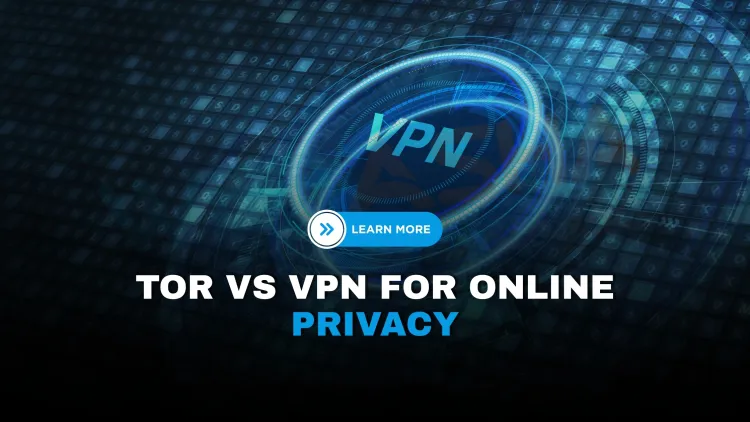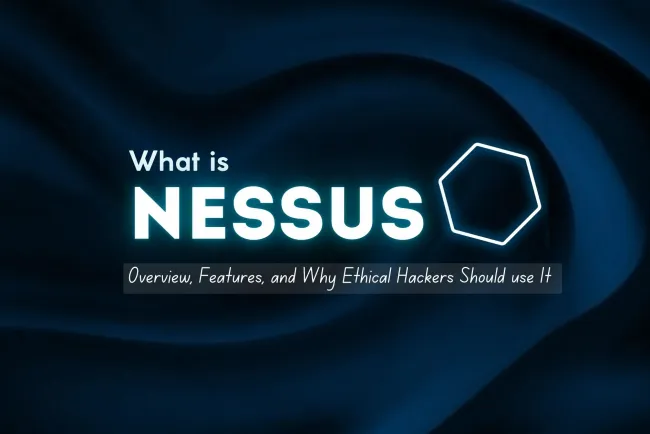Which Is Better for Online Privacy ? Tor or VPN? Pros, Cons, and Use Cases Compared
When it comes to safeguarding online privacy, both Tor and VPN serve crucial but distinct roles. Tor ensures anonymity through a distributed, multi-node network, while a VPN offers strong encryption and faster speeds via centralized servers. Tor is ideal for whistleblowers or users in high-censorship areas, whereas VPNs are preferred for secure streaming, torrenting, and general browsing. This blog compares Tor and VPN based on speed, encryption, anonymity, cost, and security, helping you decide which one best fits your online privacy needs.

Table of Contents
- Understanding the Basics: What Is Tor?
- What Is a VPN?
- Tor vs VPN: Key Differences Explained
- Pros and Cons of Tor
- Pros and Cons of VPN
- When Should You Use Tor?
- When Should You Use a VPN?
- Can You Use Tor and VPN Together?
- Conclusion
- Frequently Asked Questions (FAQs)
In today's digital world, protecting your privacy online has never been more important. Whether you're trying to stay anonymous, avoid surveillance, or access restricted content, Tor and VPN are two of the most commonly used tools. But what's the difference between the two? Which one should you use? This blog breaks down the pros and cons of Tor vs VPN, and provides a full comparison to help you choose the right privacy tool.
Understanding the Basics: What Is Tor?
Tor (The Onion Router) is a free and open-source software that enables anonymous communication over the internet. It works by routing your internet traffic through a network of volunteer-run servers (nodes), encrypting it multiple times, and making it difficult to trace.
How Does Tor Work?
When you use Tor, your data goes through three layers of encryption and travels through three randomly selected servers (also known as relays):
-
Entry Node
-
Middle Node
-
Exit Node
This multi-layered encryption mimics the layers of an onion, hence the name.
What Is a VPN?
VPN (Virtual Private Network) creates a secure, encrypted tunnel between your device and the internet through a remote server operated by a VPN provider. It hides your IP address and encrypts all your data, making your online activity private and secure.
How Does VPN Work?
When connected to a VPN:
-
Your internet traffic is encrypted.
-
Your IP address is masked with that of the VPN server.
-
All apps and websites you access think you’re in the location of the VPN server.
Tor vs VPN: Key Differences Explained
Below is a detailed table comparing Tor and VPN based on multiple criteria:
| Feature | Tor | VPN |
|---|---|---|
| Anonymity | High (multi-layer routing hides origin) | Moderate (provider knows your IP unless no-logs policy) |
| Speed | Slow (due to multiple relays) | Fast (optimized servers for speed) |
| Encryption | Partial (not end-to-end beyond exit node) | Full encryption (end-to-end) |
| Ease of Use | Moderate (Tor Browser required) | Easy (one-click apps for all devices) |
| Blocked by Websites | Often blocked | Rarely blocked |
| Free to Use | Yes | Some free, most quality services are paid |
| Data Logging | None (open-source and decentralized) | Depends on provider (check for no-logs policy) |
| Usage Suitability | Best for anonymity and whistleblowing | Best for secure browsing, streaming, torrenting |
Pros and Cons of Tor
✅ Pros of Tor
-
It is impossible to track your visited websites from your IP.
-
Free to use with open-source development.
-
Distributed network, hard to shut down completely.
❌ Cons of Tor
-
Low connection speed due to multiple nodes.
-
Exit node traffic is not encrypted, exposing your data.
-
Not compatible with many browser plugins and torrents.
-
Blocked by many ISPs and services.
Pros and Cons of VPN
✅ Pros of VPN
-
Easy to use with just one click.
-
High-speed connections ideal for streaming and downloading.
-
Strong encryption ensures full data protection.
-
Good for all applications like Skype, torrents, emails, etc.
-
Official support and customer care provided by companies.
❌ Cons of VPN
-
Free VPNs may log and sell data to third parties.
-
Premium VPNs are not free and may have a monthly cost.
When Should You Use Tor?
Use Tor if you:
-
Need high-level anonymity (e.g., journalists, whistleblowers)
-
Are okay with slower speeds
-
Want to browse .onion sites on the dark web
When Should You Use a VPN?
Use a VPN if you:
-
Want secure browsing on public Wi-Fi
-
Need fast and encrypted internet access
-
Want to stream geo-blocked content
-
Want to torrent safely
Can You Use Tor and VPN Together?
Yes, this is called Tor over VPN or VPN over Tor, depending on the configuration. Using both can add a layer of security:
-
Tor over VPN: Connect to a VPN first, then open the Tor Browser.
-
VPN over Tor: Connect to Tor, then to the VPN (harder to set up).
However, using both may drastically reduce your connection speed.
Conclusion: Tor vs VPN – Which Should You Choose?
There is no one-size-fits-all answer. If anonymity is your top priority, Tor is the better choice. If you want speed, encryption, and ease of use, a VPN is the smarter option. In some cases, using both together may be the most secure approach.
FAQ:
What is Tor and how does it work?
Tor (The Onion Router) works by routing internet traffic through a distributed network of volunteer-operated servers, ensuring that your IP address remains hidden. It uses multiple layers of encryption, which are peeled away at each node like an onion, ensuring anonymity.
What is a VPN and how does it function?
A VPN (Virtual Private Network) creates a secure, encrypted tunnel between your device and the internet via a centralized server, hiding your IP address and encrypting your traffic, making it ideal for private browsing, streaming, and bypassing geo-blocks.
How is Tor different from a VPN?
Tor provides strong anonymity using a decentralized structure, while a VPN offers secure and faster internet access using encryption via centralized servers. Tor hides who you are, VPN hides what you're doing.
Which offers better speed: Tor or VPN?
VPNs are faster because they typically route traffic through a single server. In contrast, Tor slows down your internet speed due to its multi-node relay system.
Which is more secure: Tor or VPN?
Both offer security in different ways. VPNs provide end-to-end encryption, but trust depends on the provider. Tor is more anonymous, but the exit node is vulnerable if not using HTTPS.
Can I use Tor and VPN together?
Yes, using Tor over VPN or VPN over Tor enhances privacy but can affect speed and may require technical knowledge to configure correctly.
Is Tor really anonymous?
Yes, Tor hides your identity and location well, but anonymity can be compromised by browser plugins, malware, or poor user practices.
Do VPNs log your data?
Some do. Free VPNs may log and sell user data, whereas reputable paid VPNs often have strict no-logs policies. Always check their privacy policy.
Which is better for torrenting?
VPNs are better for torrenting. Tor restricts torrent use as it can bypass the anonymity layer, exposing user data.
What are the main benefits of Tor?
-
Complete anonymity
-
Bypasses censorship
-
Free to use
-
Decentralized network
What are the main benefits of VPN?
-
Fast and reliable connections
-
Strong encryption
-
Works with most apps
-
Ideal for streaming and downloading
Is Tor legal to use?
Yes, Tor is legal in most countries, though it's often associated with the dark web. Misuse, not the tool itself, can be illegal.
Is VPN legal to use?
Yes, VPNs are legal in most countries. However, some nations (like China or Russia) restrict their use or require government-approved providers.
Which is better for accessing dark web: Tor or VPN?
Tor is better suited for accessing the dark web as it routes traffic through the .onion network.
Is Tor free to use?
Yes, Tor is completely free, maintained by a non-profit organization and supported by volunteers.
Is VPN free to use?
Some VPNs are free, but free versions may log data, have limited features, or slower speeds. Paid VPNs are more reliable.
What are the risks of using Tor?
-
Low speeds
-
Exit node vulnerability
-
Blocked nodes
-
Can be flagged by surveillance systems
What are the risks of using a VPN?
-
Logging by untrustworthy providers
-
False claims about no-logs policies
-
Potential DNS leaks without proper configuration
Which is easier to use: Tor or VPN?
VPNs are easier for general users—just install, log in, and connect. Tor requires using the Tor Browser and some technical awareness.
Can I browse Netflix with Tor or VPN?
VPNs work better for streaming sites like Netflix, as they offer servers optimized for bypassing geo-restrictions.
Can Tor and VPN bypass firewalls?
Yes, but VPNs are more consistent. Tor can be blocked by some advanced firewalls or deep packet inspection tools.
Can Tor or VPN be tracked by ISPs?
VPNs hide your activity from ISPs, but they can still see you’re using a VPN. With Tor, ISPs see Tor usage, but not the content being accessed.
Which is more suitable for journalists and whistleblowers?
Tor is more suitable due to its strong anonymity and decentralization.
Which is better for general online privacy?
For daily use like banking, shopping, or casual browsing, VPNs are better due to speed and compatibility.
Do I need both Tor and VPN for privacy?
Using both can enhance privacy, but also slow down connection and may complicate setup.
How does Tor encryption work?
Tor uses multi-layered encryption that unwraps at each node, ensuring that no single node knows both sender and recipient.
How does VPN encryption work?
VPNs use end-to-end encryption (like AES-256) through secure protocols like OpenVPN or WireGuard to protect your data.
Which is more trustworthy: Tor or VPN?
Tor is community-driven and open-source. VPN trust depends on the provider’s reputation and transparency.
Are there alternatives to Tor and VPN?
Yes, like proxy servers, I2P, and ZeroNet, but each has its own privacy and usability trade-offs.
Final Verdict: Should I Use Tor or VPN?
Use Tor for high anonymity needs like whistleblowing. Use VPN for secure, private, and fast internet access—ideal for most users. Choose based on your use case.














![Top 10 Ethical Hackers in the World [2025]](https://www.webasha.com/blog/uploads/images/202408/image_100x75_66c2f983c207b.webp)








